
Small introduction/presentation, job or activity, place of birth or country of origin, training or career, place of living
Angel Fux is a photographer and digital artist whose work blends photography and art to create striking visual narratives. Specializing in composite photography and nightscapes, Angel focuses on capturing the beauty of remote locations and the unique atmosphere of the night sky.
Born in Paris, France, Angel is Swedish and Swiss and moved to Switzerland at a very young age, where she started photography. As of today, she is still based in the French-speaking part of the country.
Angel shares her knowledge and experience through workshops, seminars, lectures, and private courses, all driven by a passion for storytelling and creating impactful visuals. Her work reflects a commitment to helping others see the world, and the night skies, in new and meaningful ways.
Tell us about your place of residence, city or region, activity and if or what you like about your hometown?
I’m based in the Lausanne area in Switzerland, a place that sits between mountains and the lake. While I don’t spend much time in the city itself, I appreciate how close I am to the Alps. It allows me to escape easily and immerse myself in high-altitude environments that are central to my photography. When I do spend time in Lausanne, it’s often to enjoy its culinary scene; the food culture here is something I appreciate. But it’s really the proximity to nature, especially the mountains, that I cherish most about this region.
Your must-see addresses near you? (restaurant, market, gallery, museum, not-to-be missed, intimate or secret address, etc.)
If you’re ever in the area, I’d recommend a dumpling restaurant called Top Beef, it’s a small gem with authentic Chinese food. There’s also a local mochi place I love called Marutcha. For something more cultural, I’d suggest a visit to the Musée de l’Hermitage. It’s an intimate art museum nestled in a quiet part of Lausanne, and it often hosts beautifully curated exhibitions in a peaceful setting.
Your favorite places on Earth?
There’s one place I keep returning to in my thoughts: a mountain pass along the Huayhuash trek in the Peruvian Andes. I’ve been there twice, and both times I felt something I hadn’t felt anywhere else. The landscape is overwhelming: towering peaks, silence, and a strange sense of emotional openness. I’m no stranger to mountains, living in Switzerland, but this place carries a different kind of energy. Everyone I’ve been with there has felt it too. It’s as if that landscape quietly invites you to connect with something deeper.
Do you think it is important to travel and why?
Yes, I believe travel is important, not necessarily in how far you go, but in how deeply you engage with places and people that are different from your usual environment. For me, travel opens up perspectives. It teaches humility. It shows me how others live, feel, and relate to the world, and it reminds me not to assume that my way of seeing things is universal. It sharpens curiosity and nurtures empathy: two qualities I believe we need more of. Some places also bring out emotions you wouldn’t access otherwise. They shift your perspective on life, on your own story, and on the world as a whole.
What do you think about the future of travel and what we (citizens) need to consider?
It’s a wide and complex question. On one hand, I see travel becoming more accessible, even virtually; immersive technologies are allowing people to explore places from home. On the other hand, I’m seeing remote places being physically made more accessible too, which brings up mixed feelings. Making nature reachable to more people can be wonderful but it also comes with risks: increased crowds, less respect for fragile ecosystems, and the loss of wildness.
What we need to consider is intentionality. Are we making places more accessible for the sake of profit, or are we thinking long-term about preservation? In Switzerland, for example, I love that there are still places you can only reach by foot. It keeps them special. It gives them time and space to breathe.
What would you advise?
First and foremost: educate yourself about nature and how to respect it. Some places are fragile, and their beauty lies partly in their remoteness or difficulty to access. I’d also advise against portraying nature dishonestly online. Far too often, people post photos without explaining how hard or dangerous a place is to reach, which creates the illusion that it’s easy or risk-free, and invites others to go unprepared.
Transparency matters. We should share things with honesty, including the effort and responsibility involved. I also think research is key: finding your own way to a place teaches you not just how to get there, but if you’re truly ready to go. Making things too easy encourages laziness and can increase risks. Not only for visitors, but for the environment and local communities too.
As a woman, how do you judge the future of our land or our societies?
That’s a broad question, and I don’t know if I have a clear answer. But I do feel that the Earth is becoming less wild. Technology is allowing us to go deeper into the oceans, the mountains, even the underground, and fewer places remain untouched. At the same time, societies are becoming more dependent on technology to experience the world. Even travel is becoming something we “consume” online before we ever arrive.
It feels like we’re moving away from the raw, unpredictable nature of discovery and I wonder what that will mean in the long run, both for the planet and for how we relate to it.
How do you think you can contribute to it? Women who stand out to you?
I try to contribute through transparency and storytelling. I aim to show the beauty that still exists, especially the night sky and places free of light pollution, and remind people that these experiences are worth protecting. Darkness, true darkness, is something many of us don’t have access to anymore. I believe it should be a right; to be able to see the stars clearly.
I also share the behind-the-scenes of my creative process. Not to glorify it, but to be honest about the effort and dedication it takes. Many of the places I photograph require physical strength, logistical planning, and patience. That’s part of the experience and part of the respect.
As for women who inspire me, one name comes to mind instantly: Jonna Jinton, from Sweden. She rarely leaves her country, yet manages to make people travel emotionally and visually through her art and her presence. She shares the beauty of her surroundings with such honesty and softness that people fall in love with her world, and in doing so, they learn to respect it more. I admire her vulnerability, her deep connection to nature, and her way of protecting what she loves simply by honoring it.
What would be your travel dream?
I have many. One of them is to explore the Himalayas, especially the northern region of Pakistan. It’s logistically challenging, but its raw beauty draws me in. Another dream is to travel across New Zealand and witness the southern night skies. I really want to see more the Milky Way from the other side of the world.
More broadly, my dream travel would be a journey that blends mountain landscapes, dark skies, and meaningful connections, ideally with people I love, and also with locals from the places I visit. I’d love it to include food, cultural depth, and a sense of wonder; the kind that makes you feel both small and alive at the same time.






